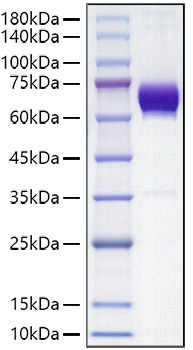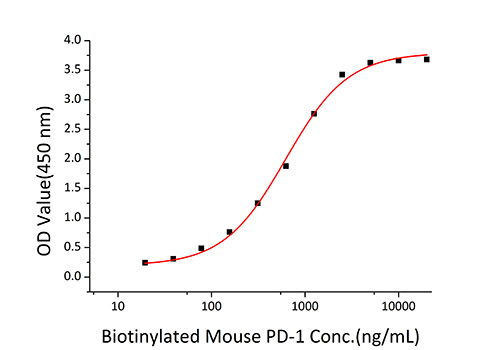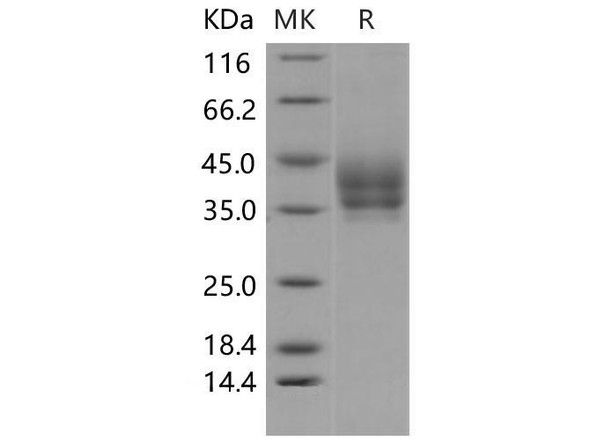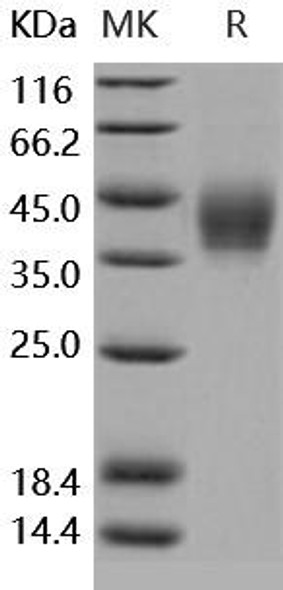Description
Recombinant Mouse B7-DC/PD-L2/CD273 Protein
The Recombinant Mouse B7-DC/PD-L2/CD273 Protein is a high-quality recombinant protein designed for murine biological research applications. This protein serves as an essential reagent in mouse model studies, comparative immunology research, and preclinical therapeutic evaluations, enabling scientists to investigate B7-DC/PD-L2/CD273 biology and its relevance to human disease mechanisms through translational research approaches.
This product (SKU: RPCB1167) is produced using HEK293 cells and features a C-hFc tag for convenient detection and purification. The protein exhibits a calculated molecular weight of 48.5 kDa with an observed molecular weight of 60-75 kDa under denaturing conditions, achieving ≥ 95 % as determined by SDS-PAGE.. Functional bioactivity has been validated through rigorous quality control assays, confirming its suitability for demanding research applications.
Key Features
| High Purity by Affinity Chromatography | |
| Mammalian & Bacterial Expression Systems | |
| High lot-to-lot consistency via strict QC |
| Product Name: | Recombinant Mouse B7-DC/PD-L2/CD273 Protein |
| SKU: | RPCB1167 |
| Size: | 10 μg , 20 μg , 50 μg , 100 μg |
| Reactivity: | Mouse |
| Synonyms: | B7-DC, B7DC, bA574F11.2, Btdc, CD273, PD-L2, PDCD1L2, PDL2, PDCD1LG2 |
| Tag: | C-hFc |
| Expression Host: | HEK293 cells |
| Calculated MW: | 48.5 kDa |
| Observed MW: | 60-75 kDa |
| Gene ID: | 58205 |
| Protein Description: | High quality, high purity and low endotoxin recombinant Recombinant Mouse B7-DC/PD-L2/CD273 Protein (RPCB1167), tested reactivity in HEK293 cells and has been validated in SDS-PAGE.100% guaranteed. |
| Endotoxin: | < 0.1 EU/μg of the protein by LAL method. |
| Purity: | ≥ 95 % as determined by SDS-PAGE. |
| Formulation: | Lyophilized from a 0.22 μm filtered solution of PBS, pH 7.4. |
| Bio-Activity: | Measured by its binding ability in a functional ELISA. Immobilized Mouse PD-L2 (RPCB1167) at 10 μg/mL (100 μL/well) can bind Biotinylated Mouse PD-1 with a linear range of 19.5-622 ng/mL. |
| Reconstitution: | Centrifuge the vial before opening. Reconstitute to a concentration of 0.1-0.5 mg/mL in sterile distilled water. Avoid vortex or vigorously pipetting the protein. For long term storage, it is recommended to add a carrier protein or stablizer (e.g. 0.1% BSA, 5% HSA, 10% FBS or 5% Trehalose), and aliquot the reconstituted protein solution to minimize free-thaw cycles. |
| Storage: | Store at -20℃.Store the lyophilized protein at -20℃ to -80 ℃ up to 1 year from the date of receipt. After reconstitution, the protein solution is stable at -20℃ for 3 months, at 2-8℃ for up to 1 week. |
Programmed Death Ligand 2 (PD-L2), also known as B7-DC and butyrophilin-like protein, is a member of the B7 family of proteins that provide signals for regulating T-cell activation and tolerance.PD-L2 is expressed on dendritic cells, subsets of activated CD4+ and CD8+ T cells, and memory B cells that differentiate into plasma cells. At inflammatory sites such as rheumatoid arthritis, allergen exposure, and virus infection, PD-L2 is up-regulated on synoviocytes, infiltrating macrophages, dendritic cells, and airway epithelial cells. PD-L2, along with B7-H1/PD-L1, binds to T cell PD-1 where it promotes IFN-gamma production and CD40 Ligand up-regulation while inhibiting IL-4 production. In addition, PD-L2 binds to RGM-B on macrophages and alveolar epithelial cells, supporting respiratory immune tolerance. In asthma, PD-L2 suppresses IL-5 and IL-13 production, promotes IL-12 production by dendritic cells, and supports allergen-induced airway hyper-responsiveness and mucus production.








